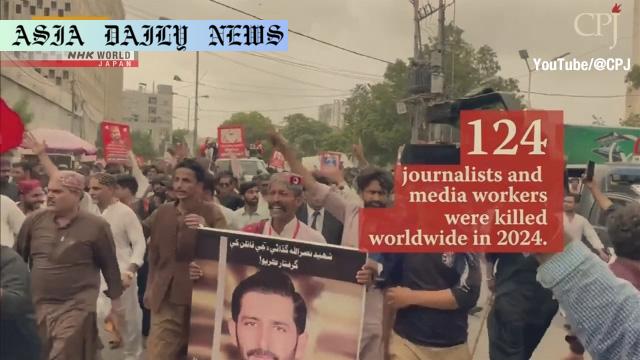Journalists: The Committee to Protect Journalists reports a 22% rise in journalist deaths last year, with 70% linked to Israeli attacks.
A total of 124 journalists and media workers were killed globally in 2023.
The figure represents a 22% increase compared to the previous year.
Roughly 70% of the fatalities were tied to Israeli attacks, with most deaths occurring in Gaza and Lebanon.
24 journalists were deliberately targeted due to their profession.
This is the highest number of journalist deaths recorded since 2007.

Record Number of Journalists Killed Globally in 2023
The past year marked a tragic record for journalists and media workers worldwide, with 124 losing their lives, according to the Committee to Protect Journalists (CPJ). This figure represents a staggering 22% increase from 2023 and surpasses the previously highest recorded number of 113 deaths in 2007, during the Iraq War. The rise in fatalities has raised alarming concerns about the safety of journalists in high-conflict zones and their vulnerability while reporting.
Impact of the Gaza Conflict on Journalists
A significant portion of these casualties is directly connected to the ongoing conflict between Israel and Gaza. Of the 124 journalists killed, 85—nearly 70%—died in attacks attributed to Israeli military action. Most of these deaths occurred in Gaza, accounting for 82 fatalities, while another three were reported in Lebanon. The Committee has described the war in Gaza as “unprecedented” in its impact on journalists, underscoring the dangers faced by individuals tasked with reporting on life-threatening conflicts.
Targeted Killings and Areas of Concern
Further analysis of the CPJ report shows that at least 24 deaths were deliberate killings, targeting journalists solely due to their work. Among these deliberate attacks was the killing of an Al Jazeera journalist in Gaza during an Israeli drone strike. Apart from Gaza, other areas that reported fatalities include Sudan, Pakistan (six each), Mexico (five), Syria (four), and three in Myanmar and Iraq respectively. These deaths highlight the systemic issue of journalist safety across different geographies.
A Historical Comparison and Global Concerns
The previous record, set in 2007 at the height of the Iraq War, saw approximately half of the casualties occur in Iraq. In comparison, the 2023 numbers are alarming due to the geographical spread and nature of deaths, with modern conflicts adding unprecedented challenges. The CPJ’s data showcases the pressing need for global interventions and reforms to protect those reporting from war zones and areas of high tension.
Call for Enhanced Protections
CPJ’s CEO, Jodie Ginsberg, emphasized the importance of securing protections for journalists, particularly in conflict areas. “The war in Gaza is unprecedented in its impact on journalists,” she said, highlighting the significance of preserving press freedom and ensuring the safety of individuals documenting critical events. Journalists play an essential role in disseminating information, and their increasing fatalities pose a grave threat to transparency and democracy globally.
The Role of Governments and International Organizations
The rising violence against journalists calls for immediate action from both governments and international organizations. Ensuring the safety of media workers in conflict zones should be a priority. More protective measures, such as adherence to international warfare laws that prohibit attacks on civilians and journalists, could significantly reduce these tragedies. Training and equipping journalists with safety protocols can also make a substantial impact.
Conclusion and Call to Action
The record loss of journalists in 2023 underscores a global failure to protect press freedom and those who serve as society’s watchdog. With the war in Gaza and other regions serving as poignant reminders, it becomes imperative for the global community to rally together to create safer environments for journalists. Without robust protections and diplomatic solutions, the loss of life will continue to affect the vital freedoms that journalism provides in shaping fair and informed societies.



Commentary
A Rising Crisis for Press Freedom
The latest report from the Committee to Protect Journalists is shocking and deeply troubling, outlining a record number of journalist deaths in 2023. It is disheartening to see such a sharp rise in fatalities, especially knowing that 70% of these deaths resulted from attacks in Gaza and Lebanon. Journalists operate as society’s truth-tellers, and this dramatic increase not only represents a loss of lives but a significant blow to transparency and democracy as well. The global community must reflect on this crisis and act decisively to protect journalists worldwide.
The Role of Governments in Ensuring Safety
Governments, particularly those involved in active conflicts, must shoulder the responsibility of safeguarding journalists. The figures unveiled by CPJ point to systemic failures in upholding these protections. International bodies also have a crucial role in ensuring accountability when journalists are harmed deliberately. While conflicts will always carry inherent risks, escalating violence against specific groups like journalists is a grim indication of declining human rights and ethical frameworks.
Urgent Need for Global Solidarity
Ensuring journalist safety is not only a regional issue but a global one requiring cross-border cooperation and solidarity. Prominent institutions, human rights organizations, and governments must unite to draft stronger policies and call for adherence to international laws protecting journalists. The courage demonstrated by journalists, particularly in war zones, is commendable, but it should not come at such a steep price.
A Broader View of Freedom and Accountability
Through the tragedy of these deaths, the importance of press freedom is amplified. Societies must hold those responsible accountable for their actions while simultaneously prioritizing strategies to ensure the safety of journalists. The increasing dangers in recent years find their root in a disregard for freedom of speech, which calls for immediate reform and advocacy for safer practices. Ultimately, this rising challenge must be met with collective action—before it’s too late.